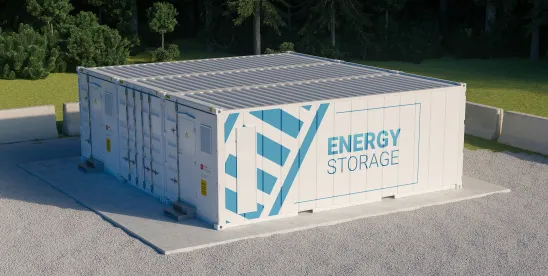The Illinois Commerce Commission staff (ICC Staff) announced recommendations laying the groundwater for Illinois’ first procurement of energy storage resources expected to occur this summer.
The state is preparing for an August 26 statutory deadline. In this post, we summarize the ICC Staff’s recommendations for project eligibility requirements, contract structure, and future procurements.
Background
Earlier this year, Illinois enacted the Electric Transmission Systems Construction Standards Act, which we covered in detail here. The Act required the ICC to conduct a workshop process to design the initial energy storage procurement. Under the law, the Illinois Power Agency (IPA) must receive bids by August 26.
According to the ICC Staff, energy storage is an important tool for Illinois to meet its goal of 40% renewable energy by 2030 and 50% renewable energy by 2040. Because solar and wind energy are intermittent, these resources do not always generate energy when consumers want to use electricity. Energy storage can help bridge this gap. Storage can also help make the energy system more reliable and efficient by charging when there is surplus, cheap energy on the grid and dispatching power when electricity is scarce or expensive.
Program Recommendations
The ICC Staff confronted three core questions in recommending the design of Illinois’ maiden storage procurement, which projects are eligible, what contract structure to use, and how much capacity to procure.
The ICC Staff recommended six required criteria for eligible projects:
- Projects must be standalone, not storage combined with electricity generation. This is a statutory requirement for the initial procurement.
- Projects must be at least 20 megawatts (MW).
- Projects must have four-hour duration, meaning they are capable of continuously dispatching power for four hours.
- Projects must be at least 85% efficient, meaning they discharge at least 85% of the power it takes to charge them.
- Projects must be currently in the grid interconnection queue or demonstrably in late-stage development.
- Projects must meet the Minimum Equity Standard and project labor requirements used in Illinois’ renewable energy certificate (REC) program.
For contract structure, the ICC Staff selected a 20-year indexed storage credit (ISC) contract instead of a tolling contract. An ISC works like a hedge or option contract. The storage developers bid a “strike price,” which is a guaranteed price for the energy dispatched from the storage unit, and the electric utility contracts with the lowest-priced bidders. If market conditions are such that the storage unit makes less money for its storage services than the strike price, then the utility pays the difference to the developer. If market conditions allow the storage unit to make more money than the strike price, the developer pays the excess to the utility. The purpose of this arrangement is to provide a guaranteed income to the developer so the developer can obtain financing to construct the storage. An ISC works by essentially transferring some of the risk of market fluctuations from the developer to the utility.
A tolling contract, which the ICC Staff did not recommend for this procurement, operates like a lease. The storage developer essentially leases operation of the storage resource to the utility in exchange for a fixed payment. Under this structure, the utility operates the storage unit and receives the benefit of using it. This structure transfers even more risk from the project developer to the utility than an ISC. The ICC Staff recommended against a tolling structure because (1) Illinois’ REC program already uses an ISC model and (2) a tolling contract is treated as a liability on utility balance sheets, making it harder for utilities to get favorable loan terms.
Last, the ICC Staff recommended that the IPA procure 1,038 MW of storage resources, less than the up to 1,500 MW authorized by the Act. The ICC Staff recommended procuring 450 MW from Ameren’s utility territory and 588 MW from ComEd’s territory based on stakeholder feedback. Other than this division, the ICC Staff generally recommended against locational preferences in selecting projects, with the exception that projects located in an Enterprise Zone or Energy Transition Community area be given a preference in the event of a tied bid price.
The ICC Staff also recommended that the IPA conduct up to three additional procurements between 2025 and 2027 to obtain at least 3 gigawatts of storage resources. It also recommended that the IPA plan to conduct additional procurements in 2028 and 2029 to meet Illinois’ needs in the 2030s.




 />i
/>i
